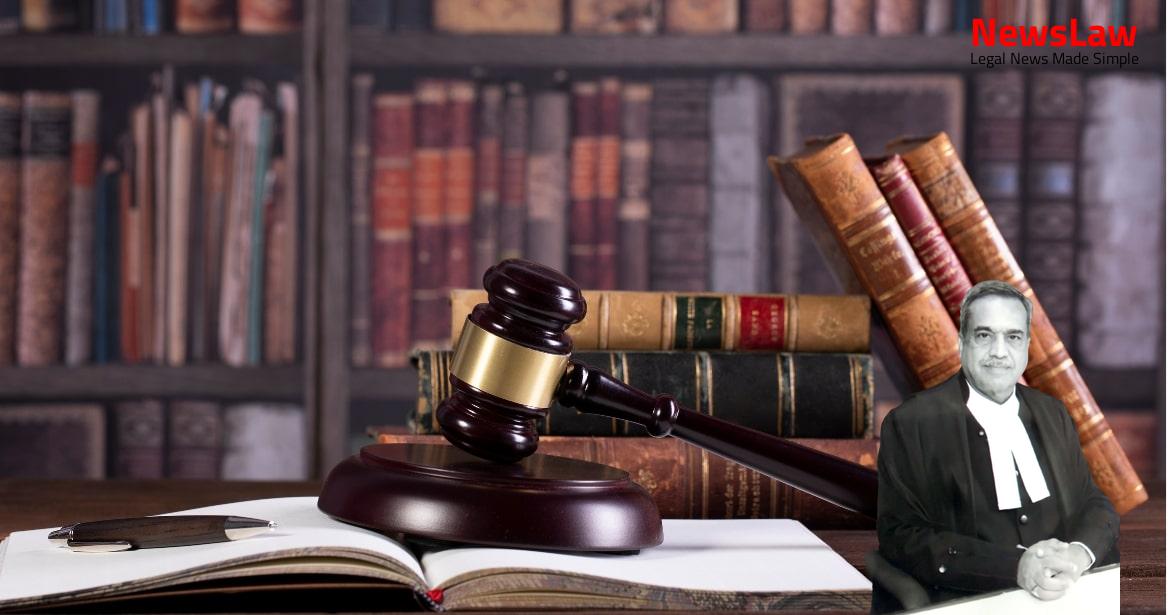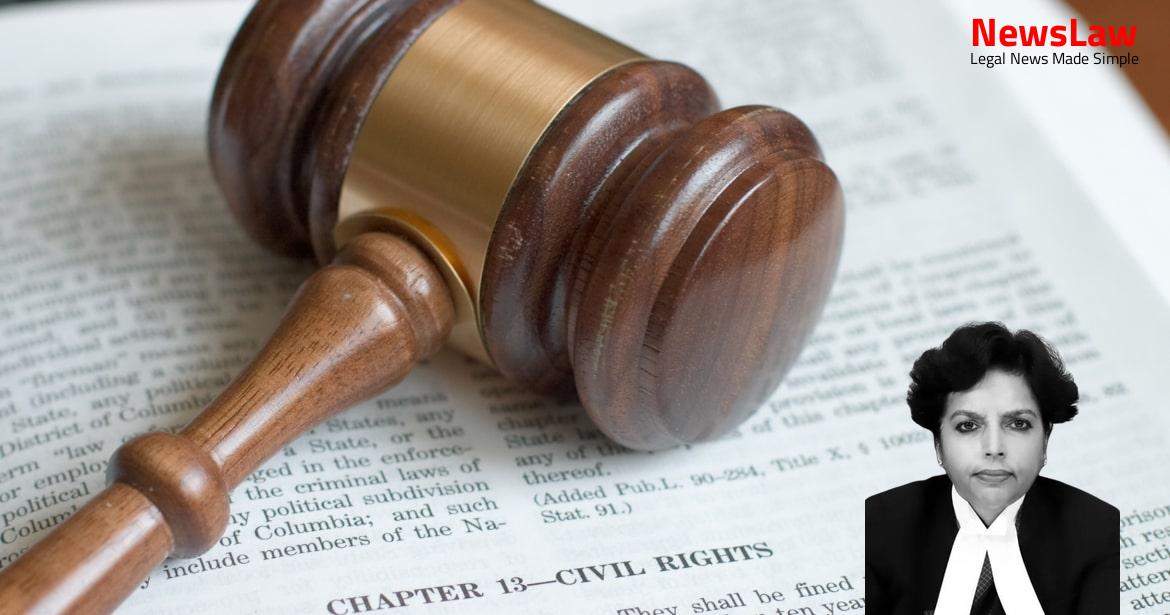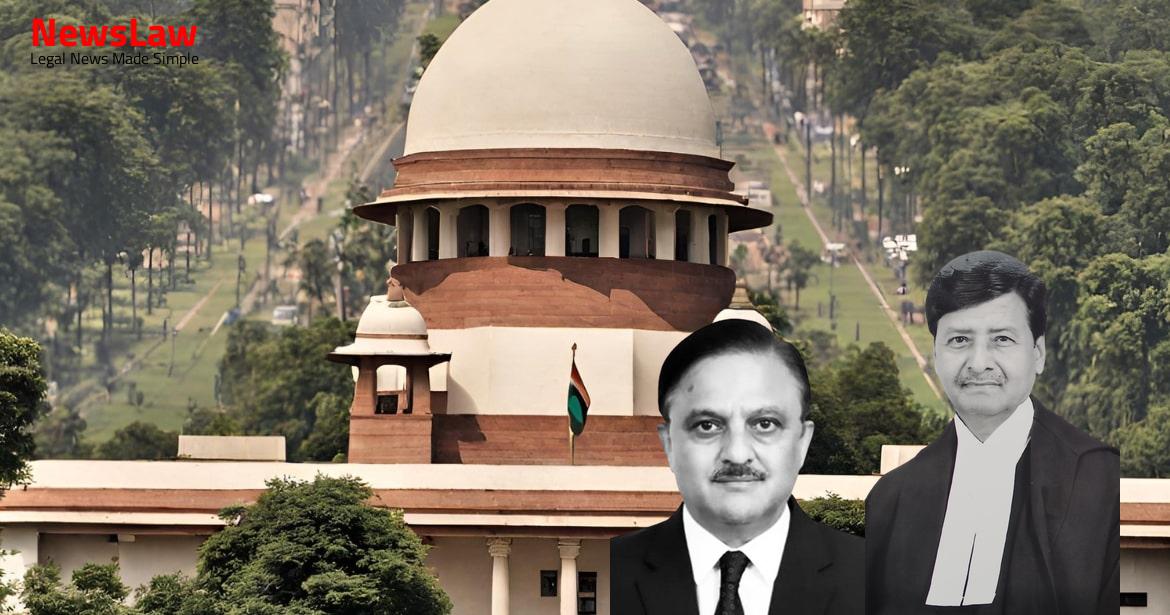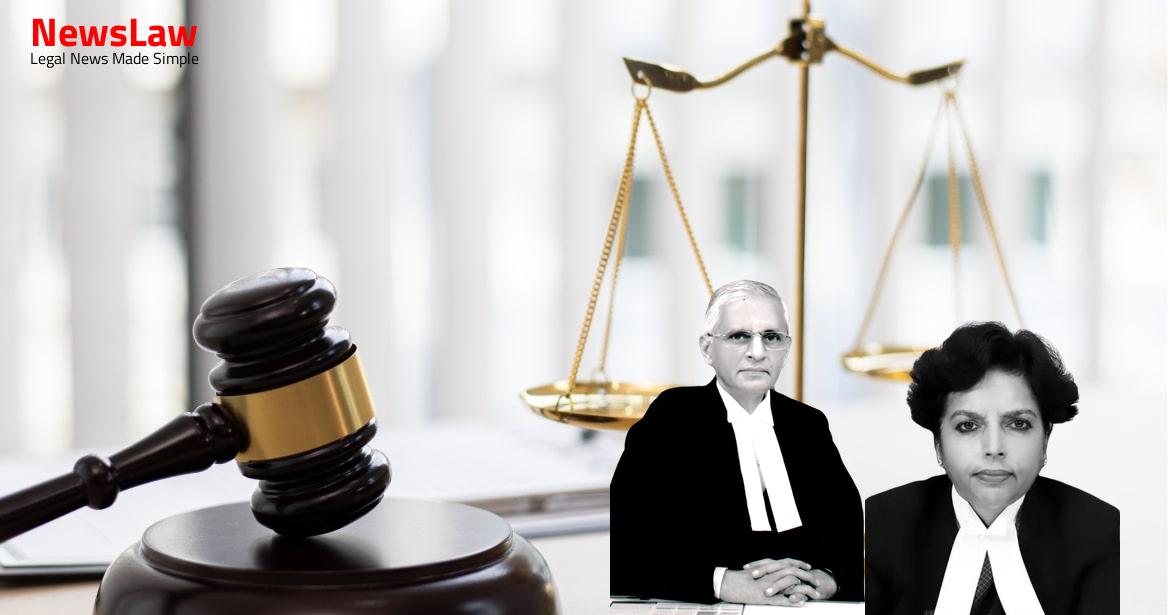Explore the in-depth legal analysis provided by the court in the case summary regarding the rejection of the plaint under Order 7 Rule 11(d). The court’s thorough examination of the law, particularly Section 34 of the Specific Relief Act, demonstrates the importance of procedural adherence in legal cases. This summary focuses on the court’s critical evaluation of the maintainability of the suit, highlighting key insights into legal complexities and barriers faced by the plaintiff.
Facts
- Crime No 475 of 2012 registered under Sections 143, 147, 447 and 427 of the Indian Penal Code.
- Plaintiff entered into an agreement for the purchase of the suit property on 15 June 2012.
- Appellant sought a loan from the first defendant through the third defendant for purchasing the property.
- Plaintiff claimed to have made payments and furnished postdated cheques towards interest.
- Plaintiff alleged to have been shown certain documents by defendants pertaining to the loan.
- Plaintiff instituted a writ petition challenging the Trial Judge’s order allowing the application of Defendant No 2 under Order 7 Rule 11.
- Plaintiff sought an amendment of the plaint under Order 6 Rule 17 for seeking appropriate reliefs.
- Plaintiff completed development on the land and purchased an adjoining plot.
- High Court rejected the writ petition filed by the appellant, stating it was an ‘after thought and belated’.
- Plaintiff alleged that a compromise was reached with the first and second defendants during the pendency of the suit.
- Plaintiff sought reliefs in the suit including declaration regarding sale deeds and cancellation.
- Application under Order 7 Rule 11 filed by second defendant for rejection of the plaint was rejected by Trial Judge on 1 August 2017.
- Plaintiff alleged conspiracies against him involving the first and second defendants along with others.
- Plaintiff claimed exclusive possession of the suit property and incorporation of defendants’ names in the sale deed was for security purposes.
- Plaintiff alleged demands for repayment by defendants and refusal to execute sale deeds even after compromise.
- Third defendant arranged a loan of Rs 7 lacs with interest at 5% per month for the plaintiff.
- Date of Order on Exhibit-50: 1 August 2017; Date of writ petition challenging order: 11 September 2017.
- Plaintiff alleged entry of defendants into the suit property with unknown persons and demands for payment.
- Plaintiff sought appropriate reliefs through amendments and challenges to court orders.
- The High Court judgment on 14 September 2018 highlighted the execution of sale deeds in the names of the first and second defendants for specific plots.
- The sale deeds for other plots were jointly in the names of the plaintiffs and the defendants, as security for loan repayment.
- The plaintiff did not seek a declaration regarding the sale deeds being security for the loan, leading to non-maintainability of the suit under Section 34 of the Specific Relief Act.
- The Trial Judge rejected the plaint under Order 7 Rule 11(d) and did not allow amendments, which was upheld by the Single Judge in the civil revision.
- The Trial Judge observed that the suit lacked a declaration regarding the purpose of the sale deeds, affecting its maintainability.
Also Read: Electoral Malpractices in Mayor Election
Arguments
- Appellant challenged the rejection of the plaint under Order 7 Rule 11(d).
- Appellant sought a declaration against the third, fourth, and fifth defendants for interference with possession.
- Argument made that the suit is to protect possession without claiming a declaration of title.
- Submission made that the suit is not barred by Section 34 of the Specific Relief Act.
- Provocation of Section 34 applies where plaintiff seeks only a declaration of title without further relief.
- Instituted a writ petition to challenge the Trial Court’s order under Order 7 Rule 11.
- High Court rejected the writ petition as belated after an application for amending the plaint to seek a declaration was filed.
- Appellant was accused of deliberately filing a writ petition instead of an appeal to bypass the issue of limitation.
- Appellant’s counsel argued that resorting to the writ jurisdiction was justified due to a civil revision application filed by other parties.
- Respondent’s counsel contended that the rejection of the plaint should have been challenged through a regular first appeal as it functions as a decree under the law.
- Emphasized that the availability of a first appeal remedy under Section 96 of the CPC was the proper course of action for the appellant.
Also Read: Balancing Power and Transparency: Electoral Bonds Struck Down, Disclosure Mandated
Analysis
- The suit appears to be barred by law and the defects are not curable.
- The challenge by the plaintiff to the order rejecting the plaint under Order 7 Rule 11(d) is deemed without substance.
- The order of the Trial Court rejecting the plaint is subject to a first appeal under Section 96 of the CPC.
- The High Court upheld the plea of the first and second defendants regarding the Trial Judge’s decision to allow amendment of the plaint.
- The High Court concluded that the direction by the Trial Judge for amendment was not lawful.
- The judgment of the Single Judge of the High Court affirmed the revision application of the defendants and dismissed the writ petition of the appellant-plaintiff.
- The appellant is permitted to seek remedy against the rejection of the plaint as prescribed by the CPC.
- Time fixed by the court for compliance shall not be extended unless exceptional circumstances are present and refusal to extend time will result in grave injustice to the plaintiff.
- The definition of ‘decree’ in Section 2(2) includes the rejection of a plaint.
- An injunction has been sought against all defendants to prevent interference with the plaintiff’s peaceful possession of the suit property.
- Section 34 of the Specific Relief Act allows a person to institute a suit against those denying his legal character or property rights; court may make a declaration of entitlement at its discretion.
- No court shall make a declaration if the plaintiff could seek further relief but omits to do so.
- A plaint will be rejected under Order 7 Rule 11(d) if it is found to be barred by any law.
- Rejection of a plaint does not prevent the plaintiff from presenting a fresh plaint for the same cause of action.
Also Read: Recall of Resolution Plan Approval: Legal Analysis
Case Title: SAYYED AYAZ ALI Vs. PRAKASH G. GOYAL (2021 INSC 342)
Case Number: C.A. No.-002401-002402 / 2021



